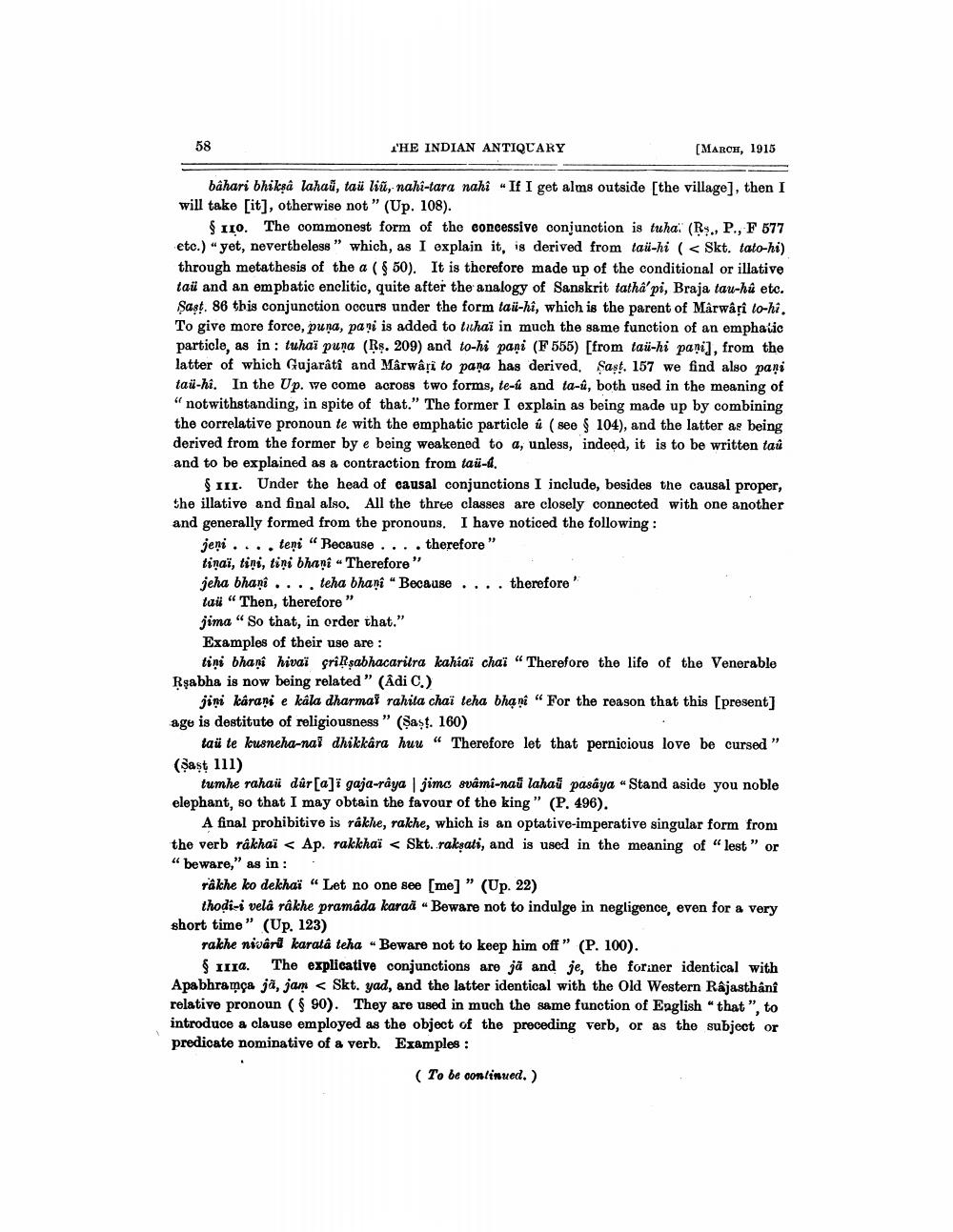________________
58
THE INDIAN ANTIQUARY
[MARCH, 1915
bahari bhiksa lahau, tai liu, nahî-tara nahi "If I get alms outside [the village], then I will take [it], otherwise not" (Up. 108).
§ 110. The commonest form of the concessive conjunction is tuha. (Rs., P., F 577 etc.) "yet, nevertheless" which, as I explain it, is derived from tau-hi (< Skt. tato-hi) through metathesis of the a (§ 50). It is therefore made up of the conditional or illative tau and an emphatic enclitic, quite after the analogy of Sanskrit tatha'pi, Braja tau-hû etc. Sast. 86 this conjunction occurs under the form tai-hi, which is the parent of Mârwârî to-hi. To give more force, puna, pani is added to tuhai in much the same function of an emphatic particle, as in tuhaï puna (Rs. 209) and to-hi pani (F 555) [from tau-hi pani], from the latter of which Gujarâtî and Mârwâri to pana has derived. Sast. 157 we find also pani tau-hi. In the Up. we come across two forms, te-û and ta-û, both used in the meaning of "notwithstanding, in spite of that." The former I explain as being made up by combining the correlative pronoun te with the emphatic particle û (see § 104), and the latter as being derived from the former by e being weakened to a, unless, indeed, it is to be written tau and to be explained as a contraction from tau-4.
§ III. Under the head of causal conjunctions I include, besides the causal proper, the illative and final also. All the three classes are closely connected with one another and generally formed from the pronouns. I have noticed the following:
jeni.... teni "Because. . . . therefore"
tinai, tiņi, tiņi bhani "Therefore"
jeha bhani.... teha bhani "Because . . . . therefore"
tau "Then, therefore"
jima "So that, in order that."
Examples of their use are:
tini bhani hivai griḥṣabhacaritra kahiaï chaï "Therefore the life of the Venerable Ṛsabha is now being related" (Adi C.)
jini karani e kala dharma rahita chai teha bhani "For the reason that this [present] age is destitute of religiousness" (Sast. 160)
tau te kusneha-nai dhikkara huu " Therefore let that pernicious love be cursed" (111)
tumhe rahai dûr [a]i gaja-râya | jima svâmî-naï lahaŭ pasaya "Stand aside you noble elephant, so that I may obtain the favour of the king" (P. 496).
A final prohibitive is rakhe, rakhe, which is an optative-imperative singular form from the verb râkhaï < Ap. rakkhaï < Skt. rakṣati, and is used in the meaning of "lest" or "beware," as in :
rakhe ko dekhaï "Let no one see [me]" (Up. 22)
thodi-i vela râkhe pramâda karaä "Beware not to indulge in negligence, even for a very short time" (Up. 123)
rakhe nivâri karatâ teha Beware not to keep him off" (P. 100).
§ 111a. The explicative conjunctions are ja and je, the former identical with Apabhramça ja, jam < Skt. yad, and the latter identical with the Old Western Rajasthânî relative pronoun (§ 90). They are used in much the same function of English "that", to introduce a clause employed as the object of the preceding verb, or as the subject or predicate nominative of a verb. Examples:
(To be continued.)




